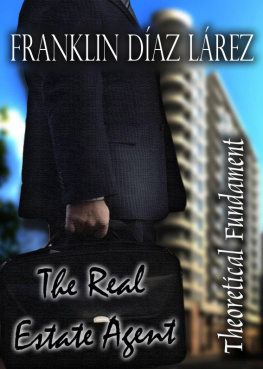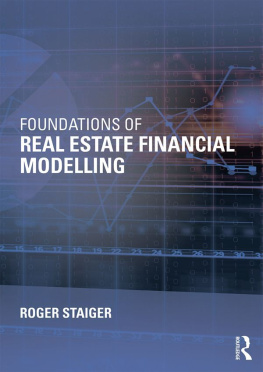The Real Estate Agent
Theoretical Fundament
Franklin Daz Lrez
Smashwords Edition
CopyrightJuly 2022
Tenerife Espaa
The Real Estate Agent - TheoreticalFundament
Written ByFranklin Daz Lrez.
Copyright 2022 Franklin Daz Lrez.
All rightsreserved.
SmashwordsEdition .
Posted by Franklin Daz Lrez onSmashwords.
Smashwords edition userlicense.
The copyright license for this e-book is foryour personal enjoyment. Therefore, you cannot resell it or give itto other people. If you'd like to share it, kindly purchase anadditional copy for each recipient. If you are reading this and itwas not purchased or given to you for your exclusive use, go toSmashwords and download your copy.
Thank you for respecting the author's hardwork.
TABLE OF CONTENTS
.
CHAPTER 1
THE ESTATE AGENT. CONCEPT AND GENERALITIES.
The estate agent is a person, naturalor juridical, that operates in his own name or representation ofothers, mediating between people who wish to make a juridicalbusiness with a real estate.
It is necessary to establish someprecisions regarding this concept.
In the first place, it is important toclear out that when we consider a person natural or juridicalwe mean that it can be a person, such as a human being, or anenterprise. Both are persons from the legal point of view, and asa consequence, they are holders of rights and obligations. Thefirst of them are considered natural persons, and the second arejuridical persons.
In the second place, the expression inhis own name o representing others means that the operation can bedone by the agent by himself, or as an emissary or agent of otherperson.
When we say that the agent acts inhis own name, we refer that he operates on his behalf, that is tosay, without representing anybody but himself, like an individual.On the contrary, when we say that the agent operates inrepresentation of other, in this case his operations are made onbehalf of a third person, natural or juridical.
It seems simple at first sight, but it isimportant to establish the difference due to the determination ofthe people who are, or will be, subjected to obligations with theintermediation of the state. When the state acts in his own name,it is obvious that he contracts obligation individually, but, whenhe does on other people behalf (people or enterprise) the otherpeople are forced to meet their obligations, not him.
Lets explain this point abit more.
An obligation is a juridical legal bondthat joins one person to another. The tenant of an apartment isbound with the leaseholder to pay him the rental fees, to complywith the stipulations of the neighborhood, to keep up with theservices which has assumed to pay, and not to deteriorate theproperty that he has been trusted for its use. These are examplesof obligations.
Another example of obligationwould be the case in which the property purchaser that asks the Bank for aloan to pay for it. He will be obliged with the bank, during theperiod stipulated by contract, to pay, in time and form, the amountaccording to the capital charge-off plus interests.
An example of an incurredobligation byThe Real Estate Agent would be when he agrees with the propertyowner to look for a purchaser or leaseholder according to theprevious established conditions.
The breach of this obligation would takeplace when the owner could demand responsibilities to The RealEstate Agent. Lets suppose that an owner trusts his property to astate agent through a contract, with the requirement that he couldrent it only to a couple without children or pets, but The RealEstate Agent leaves that requirement aside and rents it to anumerous family, with four children, two grandparents, an uncle andaunt, dogs, cats and parrots, and even more, they leave theproperty deteriorated when moving at the end of thecontract.
Independently of the tenantsresponsibility with the property owner, here comes a responsibilityon the part of The Real Estate Agent. He could be demanded by theowner for contract breach, and he will have to face theconsequences and damages derived from his own misbehavior. Thebreach of his obligation caused damage, and to the law Anyone whocauses damage to another person is forced to repair it. This is auniversal principle of Law.
If in thisconc retecase, The Real Estate Agent acts in his own name, he will have toassume personally the consequences of his own acts. Furthermore, ifThe Real Estate Agent acts in name of a third person, that personwill have to assume the responsibility of the obligationbreach.
Lets clear now the meaning of juridicalbusiness
That concept means a pact oragreement made between two or more parts, whose purpose is to produceconsequences and legal effects.
Any person that would not be affected bylegal limitations can make pacts or agreements to produce juridicaleffects, in other words; they can contract. Examples of limitedpeople to sign contracts are children and mental disables, amongothers.
A contract i s an agreement between two partsto produce legal consequences. It is a way of creating laws, if youtake verbatim, that is to say: contract is law between the parts.The contractors must respect the contract in the same way theyrespect the rest of law. The clauses, or parts of a contract, arejuridical norms of forced breach to those intervenient people. Aslong as such clauses do not contradict what is arranged in thevalid juridical ordeal. For example, a leasing contract would notbe valid if it is stipulated that the hired house has to beexclusively used for selling drugs, prostitution, or any otheractivity forbidden by law.
Finally, and it is also very important,to clear out what it must be understood by a realstate.
Firstly we must define what theyare. What is a good of property?
A good of property is an object orsomething that has utility, and it is susceptible of beingeconomically valued. This is the conception.
There are manyclassifications of properties. The one we are interested in is theclassification that splits them into movable and immovableproperties.
What are the immovableproperties?
A simple notion tells us that they are theones that cannot be moved from one place to another without losingits essence, or substance.
You cannot take a house from one place toanother without destroying it (unless it is a van, of course). Youcannot move the land. You could not take an apartment from onebuilding and put it into another.
The immovable properties are also calledreal state, because they are adhered to the soil, tied to thefloor with a root, like trees.
And What are the movableproperties?
On the contrary, movable properties arethe ones that can be translated from place to place without losingtheir essence.
A televisio n set is still a television seteven though you take it from the store to your house, unless itfalls and breaks on your way home.
So, which are the immovable properties andwhich are the movable ones?
The immovable properties arehouses, buildings, apartments, land and farms. On the contrary themovable ones are furniture (sofa, armchairs, and chairs), thehome appliances (televisions, irons, radios, computers, etc.),beds, dining rooms, bookshelves, etc.
Vehicles, such as cars, auto motors andships of all classes (ship, yacht, motorboats, etc) are alsoconsidered movable properties including spaceships (planes,rockets, etc.). These are different from the rest of movableproperties because of their expensive economical value. For thatreason they have an exclusive and special registration regime(Automotive Registry for the vehicles; Ships and Aircraft Registryfor airplanes; Merchant Marine Registry for the Ships, etc.) It issaid that they are a kind of Movable properties that are used tobeing registered.
There are also special kinds ofmovable properties that are considered immovable by the law due toits nature. That is the case of the furniture adhered to a house orapartment, like the cooker or the sanitary or electric facilities,they are considered immovable because of its function.
Next page









